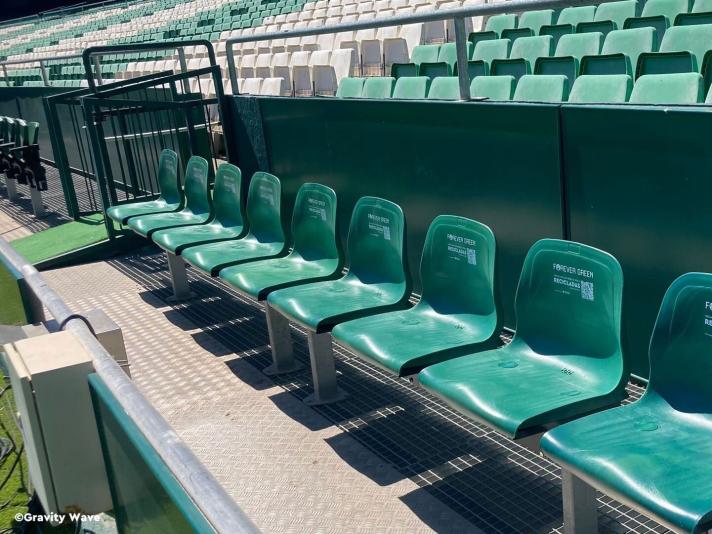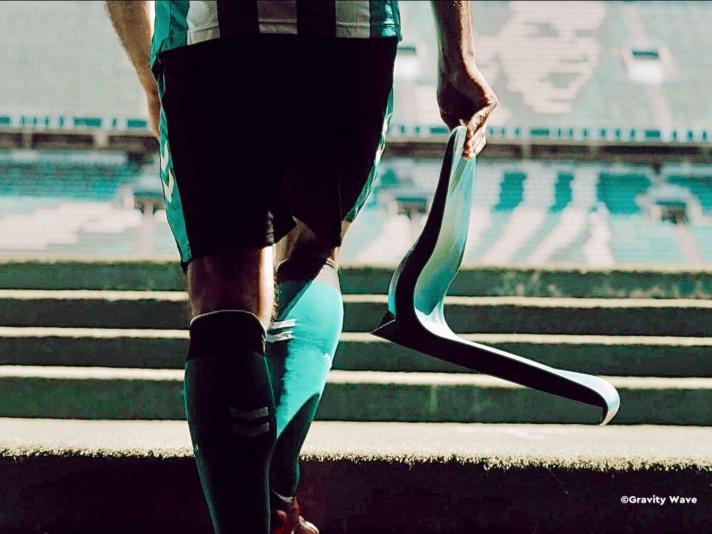
In the heart of Seville, Spain, football fans can enjoy the comfort of their new stadium seats thanks to the joint efforts of the Gravity Wave project and the famous Real Betis football club. The seats were made from plastic waste from the Mediterranean.
Gravity Wave has benefitted from the Next Generation EU programme.
Giving a second life to ghost fish nets
Gravity Wave is a social entrepreneurship project that started at the end of 2019 with the aim of addressing one of the biggest global challenges: plastic pollution in seas and the ocean.
Every year, between 8 and 12 million tons of plastic waste becomes part of the ocean. Almost half of this waste belongs to fishing gear, specifically fishing nets that can take a long time to degrade and become death traps for all kinds of marine species.
Gravity Wave, which works with a community of artisanal fishers, transforms the fishing nets it collects from seas and ports to give them a second life in furniture and products with a long useful life through a circular economy process.
Since 2020, the team has
- collaborated with more than 5,000 traditional fishers – who receive a financial compensation for every kilo of plastic they collect from the sea
- implemented a prevention system in more than 150 ports in the Mediterranean, where it facilitates the recycling and management of fishing nets for fishers and ports through containers
- collected more than 400,000 kg of plastic
- partnered with more than 100 companies willing to get involved in the #Plasticfreeoceans movement
A unique collaboration between science and sport
Real Betis, one of Spain's most beloved football clubs, recognised the potential of Gravity Wave’s innovative approach. They shared Gravity Wave's commitment to environmental responsibility and were eager to contribute to a cleaner, greener future.
Gravity Wave's team worked diligently to develop a process that could transform plastic waste into stadium seats that met the rigorous standards of comfort, durability, and aesthetics. After months of research and development, they achieved their goal. The result was a groundbreaking range of seats made entirely from recycled plastics, offering spectators not only a comfortable place to watch their beloved Real Betis but also a symbol of sustainable innovation.
The project began with 30 pilot seats that were installed on 16 April in a league match against RCD Espanyol, another well-liked soccer club in the Spanish league, called the Sustainability match promoted by Forever Green, the environmental sustainability programme of Real Betis Balompié, in collaboration with Reale Seguros, promoter and partner of this action as well.
This milestone represents one more step towards environmental sustainability. We hope to inspire other football clubs to make 100% recycled seats. We have to take advantage of the great platform that football represents to raise awareness around the world of the importance of protecting the environment. We are proud to be able to carry out this unique initiative with the help of our sponsor Reale Seguros, our partner of Forever Green, Gravity Wave and the Plastic Free Oceans movement.
said Rafael Muela, manager of the Real Betis Foundation.
The support of Next Generation EU
The project has benefitted from the EU’s recovery programme Next Generation EU in Spain
- In 2022, Gravity Wave received support in the form of a €134,000 ENISA Loan. This loan was used for key initiatives, including R&D testing, exploring new product suppliers, expanding its presence in Spanish ports, and growing the sales team.
- In 2023, Gravity Wave also obtained 6,000 euros, specifically through a Digital Kit designed to boost its growth in the digital arena and strengthen its company positioning. The overall goal was clear: to increase its online visibility, deliver an exceptional customer experience and streamline financial management, all in support of its mission to advance the Plastic-Free Oceans movement.
Thanks to this support and the company's rapid growth in a short period of time, Gravity Wave has become the leading marine plastic collection company in Spain and operates in several regions, including the Mediterranean, Cantabrian and Atlantic coasts.
A sustainable legacy
The implementation of these recycled seats at the Estadio Benito Villamarín, Real Betis' home ground, marked a historic moment. Fans, players, and officials alike were proud to support a football club that had taken such a significant step towards environmental sustainability.
This initiative aligns with the broader goals of the European Union's NextGenerationEU programme, which aims to drive sustainable recovery and promote environmental responsibility.
It is also in line with the EU zero pollution action plan which aims to reduce by 50% plastic litter at sea and by 30% microplastics released into the environment by 2030.
More information
Video of the project: EL REAL BETIS, REALE SEGUROS Y GRAVITY WAVE LANZAN LOS PRIMEROS ASIENTOS HECHOS CON REDES DE PESCA - YouTube
Details
- Publication date
- 28 September 2023
- Author
- Directorate-General for Maritime Affairs and Fisheries






